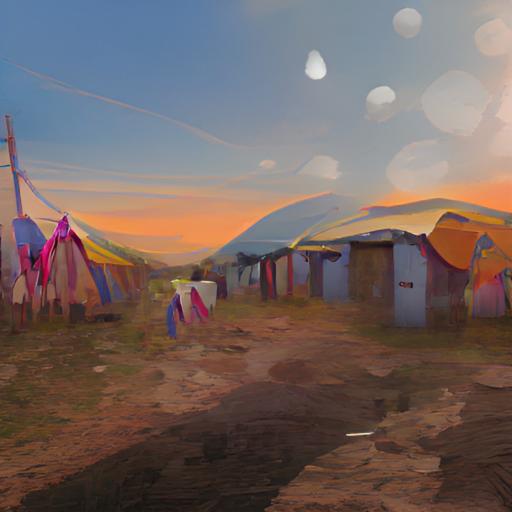Last November, the Cardano Foundation announced that it is partnering with Switzerland for UNHCR (the United Nations Refugee Agency). This partnership emerged from the second annual Global Impact Challenge, an opportunity for Cardano to forge new partnerships that showcase the ability of blockchain to impact the world for good.
The announcement was an exciting moment at the 2022 Cardano Summit in Lausanne, Switzerland. The project was launched with two basic parts:
- First, Switzerland for UNHCR launched a new Cardano stake pool, ticker WRFGS, which stands for “With Refugees”. Pool rewards will fund the agency’s work with refugees and displaced people.
- Second, the Cardano Foundation staked 3.5 million ada to the new WRFGS pool. This is enough to ensure that the pool starts minting blocks and earning rewards immediately.
As of this writing, the WRFGS pool has already minted 64 blocks.
However, this was just the beginning
The big dream isn’t that the Foundation will perpetually stake a few million ada to the pool just to keep it alive. Rather, the hope is that the WRFGS pool would become embedded in the community, kept flush with many more million ada from many delegators. This would produce a lasting and steady stream of rewards to fund UNHCR’s work with displaced men, women, and children all over the world. Furthermore, it would be an amazing success story that would pave the way for other organizations to undertake similar efforts.
So what stands between the spark of inception and the inspired end-goal? Well, there are a few things.
New Technology meets Old Wisdom
First, the WRFGS pool is currently set as a 100% margin pool, meaning that delegators don’t earn their own rewards – ALL rewards go to the pool. This is not unheard of, but when it’s done successfully it’s usually by an ISPO, which often offers delegators a Cardano native token or other perks in return for supporting the project by foregoing their rewards. The WRFGS pool lacks that type of incentive at this time, and while we all like to do a little good in the world, many ada holders simply aren’t attracted to the prospect of losing ALL their staking rewards, even if it’s going to a good cause.
To understand what was behind this decision, I spoke to Alvaro Cosi, Head of Innovation at Switzerland for UNHCR. He explained that one reason the pool is set to a 100% margin is that higher-ups at the agency had trouble understanding how a fundraising pool could ethically offer monetary rewards to participants. After all, when you donate to a typical charity, you don’t expect to get paid. Alvaro acknowledged that this really stems from where they are on the learning curve about how staking works. As an organization, they are learning that participant rewards are not really being “paid out” by the pool operator, and it’s not the same as getting paid for donating. It sounds like the possibility of changing the margin is absolutely on the table as one update the pool might make in the future to attract more stake.
Can we help you?
A second potential issue is that the WRFGS pool pledge is set to 0 ada, which is far from typical or ideal. Pool pledge represents a pool owner’s skin in the game. It’s an amount of their own ada that they pledge to leave locked in the pool. A pool owner with a large pledge is going to be highly motivated to make sure their pool is successful and minting blocks, because otherwise they won’t be earning any rewards on their own ada. Encouraging substantial pledges also reduces network risk – someone can’t easily launch and control dozens of successful pools all by themselves in order to gain control of the network, because it would require millions of ada in pledge to attract enough delegation to become a threat. Cardano’s rewards calculation also slightly favors pools with higher pledges with higher rewards, as another way to encourage beefy pledges.
This is another case where it seems that education and trust-building are going to pave the way forward. Alvaro explained that when they were able to get approval from the agency to try this newfangled fundraising strategy, they were NOT, in the same conversation, able to get approval to lock agency funds into crypto. In fact, one condition of participation was that ALL rewards raised by the pool would be converted immediately into fiat. No provision has yet been made for “holding” crypto assets, even for a pool pledge (“What in the world is a pool pledge?” wonder the TradFi bean counters….).
Fortunately, this is probably just a speed bump, not a dead end. Upon noting the glaring goose egg in the WRFGS Pledge stats during a Cardano Over Coffee Twitter Space, show host @HEROsPool offered 1000 ada on the spot to seed the pool’s pledge. This offer was immediately echoed by others on the call who were willing to donate some ada to help the pool establish a pledge fund.
When I spoke to Alvaro the next day, he noted that it might not be just as simple as taking these generous community members up on their offer. One thing about the pool rewards is that it allows them to earn revenue to fund their mission – without having to juggle any of the paperwork and legal considerations of fielding international donations! In any case, the lively conversations that are happening, backed up by generous offers from the community to pitch in with whatever it takes, inspire confidence that this problem will find its solution.
Weaving the future
The threads holding this story together so far are:
- The power of partnerships big and small
- The importance of education for the global adoption and impact of blockchain
Both of these threads have a lot more spool to unwind. Next time, we will pull a bit more on the partnership thread, because there are already a few more exciting yarns to tell.
You can follow and support this project:




No comments yet…